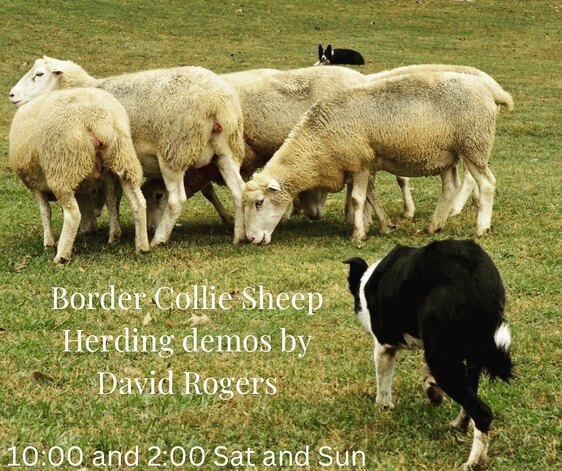
One of the festival favorites are the sheep-herding Border Collies that David Rogers brings for the festival. Border Collies were developed in Scotland as sheep-herders, and are invaluable to shepherds herding sheep. In the U.S., they are also used to herd other types of livestock.
David’s demonstrations show the dogs’ uniqueness as a breed. “These dogs are selected for how well they can be trained, and they have to be extremely intelligent to do that. They are considered one of the most intelligent dog breeds in the world because of what they are expected to do. They have an instinct to herd livestock– not just intelligence or an ability to follow directions, and this sets them apart from other intelligent breeds.”
I asked David about whistles and hand signals often used to communicate with the dogs. “We don’t use hand signals, because we want the dogs to look at the livestock. We use a variety of verbal commands and whistles. If a dog is a quarter of a mile away, they can’t hear the spoken
word very well, but they can hear and identify the meaning of a particular whistle.” Border Collies and herding is complicated, and David’s demonstrations make it clear that Border Collies are special. They are not, however, recommended as pets. “I never suggest a Border Collie for a pet because these dogs need a tremendous amount of time, space, and attention. They have tremendous energy levels, and can run 75 miles a day, working seven days a week.” He adds, “The dogs can be overheated and hurt if not handled properly.” He’ll show and tell you more at the festival.
David’s demonstrations show the dogs’ uniqueness as a breed. “These dogs are selected for how well they can be trained, and they have to be extremely intelligent to do that. They are considered one of the most intelligent dog breeds in the world because of what they are expected to do. They have an instinct to herd livestock– not just intelligence or an ability to follow directions, and this sets them apart from other intelligent breeds.”
I asked David about whistles and hand signals often used to communicate with the dogs. “We don’t use hand signals, because we want the dogs to look at the livestock. We use a variety of verbal commands and whistles. If a dog is a quarter of a mile away, they can’t hear the spoken
word very well, but they can hear and identify the meaning of a particular whistle.” Border Collies and herding is complicated, and David’s demonstrations make it clear that Border Collies are special. They are not, however, recommended as pets. “I never suggest a Border Collie for a pet because these dogs need a tremendous amount of time, space, and attention. They have tremendous energy levels, and can run 75 miles a day, working seven days a week.” He adds, “The dogs can be overheated and hurt if not handled properly.” He’ll show and tell you more at the festival.